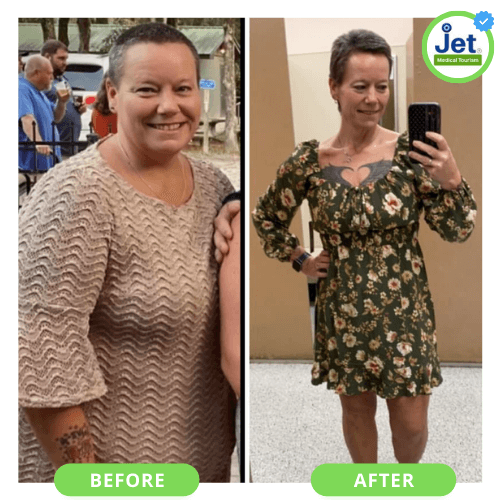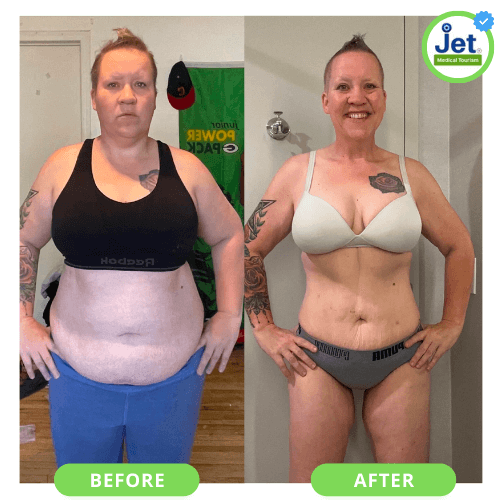Can You Live A Normal Life After Gastric Sleeve?
Deciding to get gastric sleeve surgery is an extremely difficult choice that will permanently change your digestive system. For those struggling with severe obesity and related illnesses like diabetes or heart disease, sleeve surgery can seem like a ray of hope after years of failed diets and struggles losing weight.
Losing excess weight and discontinuing medications undoubtedly appeal to many. However, undergoing such a drastic, life-altering procedure can also be intimidating. After removing part of your stomach, will eating, exercising, and participating in social and family events ever feel “normal” again? What changes can one expect in the first year and beyond?
Understanding realistic expectations for life after bariatric surgery is key in determining if bariatric procedures like sleeve gastrectomy are the right choice personally. Here’s an in-depth look at physical, emotional and lifestyle changes following gastric sleeve surgery.
Life After Gastric Sleeve Surgery
Within First Year
Patients undergo significant adjustments during the first year after surgery as their stomach heals from the surgical reduction. Under their doctor’s guidance, they must actively follow a strict diet progression, transitioning from liquids to purees and eventually to soft foods.
Eating too much or advancing too quickly can cause pain, nausea, and vomiting. Weight loss during the first 12-18 months is extremely rapid, which can leave patients fatigued. There are both physical and emotional ups and downs.
After Second Year
However, by the second year, most gastric sleeve patients establish a “new normal” and feel much better adapted to changes in their lifestyle. As the rapid weight loss phase ends, energy levels rise. Patients become more active and increase their ability to exercise. Walking, swimming, cycling and other low-impact activities are popular and help maintain ongoing weight loss. Many patients describe feeling happier, more confident, and hopeful during this time with over 50-60% of their excess body weight now lost.
After 5 Years & Beyond
5-7 years after surgery, total weight loss and health gains achieved are very promising for many sleeve patients according to multiple studies. While some regain is common over time, most patients keep significant weight reduction compared to their starting obesity levels. Because of this maintained loss, remission of related health conditions like type 2 diabetes, high blood pressure, sleep apnea, etc. are quite common several years out.
Of course, some sleeve patients do struggle with ongoing nausea, stomach pain, acid reflux, malnutrition, insufficient long-term weight loss or weight cycling. Close medical monitoring is essential to catch and treat potential deficiencies or mental health issues quickly. For some patients, conversion to more invasive bariatric revision options later in life like gastric bypass become necessary as well. But for most who stay compliant to lifestyle changes and follow-up care, life years after gastric sleeve surgery is extremely promising and hopeful.
Nourishing a New Relationship with Food
Can You Ever Eat Normally After Gastric Sleeve?
In the first 6 months after surgery, eating cannot be considered “normal”. The gastric sleeve diet begins with strict liquids only, advancing slowly to pureed foods, and finally small portions of soft nutritious solids. During this initial healing period, overeating can damage the sensitive stomach pouch and feels extremely uncomfortable.
However, after 6-12 months, many gastric sleeve patients find they can enjoy a wide variety of foods again, including:
- Well-cooked tender meats
- Whole grains like oatmeal, brown rice, quinoa in small portions
- Cooked vegetables that digest easily
- Soft fruits like bananas, berries, citrus
- Greek yogurt
- Eggs
- Low-fat cheeses
With mindful eating habits, slower pacing, proper chewing, good hydration, and reasonable portion control, these nutritious foods can be tolerated without pain or vomiting by 1 year post-op for most.
In summary – while eating is permanently changed after bariatric surgery, life does include the joys of flavor again. With mindfulness of one’s limits, personal intolerances, and listening to internal feedback from the gastric sleeve pouch, patients discover a fulfilling “new normal” diet over the long term.
Foods You Can Never Eat Again After Gastric Sleeve
While there aren’t necessarily foods you can never eat again, there are considerations. Certain foods may cause discomfort or complications post-surgery. It’s about making informed choices, steering clear of items that may hinder your progress, and embracing a sustainable, health-focused diet.
Food intolerances that persist long-term typically fall into these categories:
- Dense Carbohydrates: Excessive breads, grains, crackers and pasta can painfully stretch the sleeve pouch over time or lead to weight regain. These compact carbs should be limited to small portions.
- Tough, Fibrous Meats: Fatty chunks of beef, lamb or pork with gristly membranes don’t break down well and can obstruct the narrowed sleeve passage. Ground meats digest easier.
- Skins and Peels: The skin on chicken or potatoes and apple peels for example can get stuck during gastric sleeve digestion, causing pain or vomiting. Removing peels/skins prevents issues.
- Nuts and Seeds: While healthy fats are important in the sleeve diet, whole nuts, seeds and coconut can painfully obstruct the smaller stomach pouch for some. Nut butters or oils are easier tolerated options.
- Fried Foods: High fat fried items like chips, french fries, chicken nuggets and such are more likely to cause urgent bathroom needs, nausea or stomach cramps due to poor digestion. They also encourage weight regain.
- Foamy Carbonation: The air injected into fizzy drinks like soda or beer can cause intense gas pain. Flat water with lemon/lime or decaf tea make healthier beverage choices.
By understanding and eliminating gastric sleeve intolerances that persist long-term, patients can thrive through well-informed nutrition choices catered to their new digestive anatomy. With some reasonable limitations, vibrant health and great food enjoyment are certainly possible for life after bariatric surgery.
Is Gastric Sleeve Worth The Risk?


Any surgery carries risks of complications, which sleeves have slightly more of compared to other procedures. But for those facing deadly conditions from obesity, potential gains often make risks worthwhile. Beyond just cosmetic benefits, sleeves facilitate huge medical improvements for many. Over 75% see diabetes remission, reduced joint pain, better fertility, heart health gains and happiness from reclaiming their lives. With doctor guidance and personal diligence, sleeve patients can safely manage complications in exchange for incredible health turnarounds.
In summary, while life post-sleeve surgery isn’t the same as before, it often settles into a positive “new normal” for most patients. The key is making necessary eating, exercise and lifestyle adjustments long term. Though the initial 1-2 year adjustment period can be challenging, it’s short relative to years prior to suffering obesity. With commitment to ongoing healthy habits and utilizing support resources, sleeve patients thrive – with lifelong improved health and renewed confidence.
Ready to say goodbye to the challenges of obesity?
Tired of struggling with obesity? Jet Medical Tourism offers affordable, world-class weight loss surgery to help you transform your life.
Our experienced bariatric surgeons provide expert care through every step of this life-changing process. Contact us now to start your weight loss journey!



